Latin Mass
About Andrew Cusack
 Writer, web designer, etc.; born in New York; educated in Argentina, Scotland, and South Africa; now based in London.
Writer, web designer, etc.; born in New York; educated in Argentina, Scotland, and South Africa; now based in London. read more
News
Blogs
Reviews & Periodicals
Arts & Design
World
France
Mitteleuropa
Knickerbockers
Argentina
The Levant
Africa
Cape of Good Hope
Netherlands
Scandinavia
Québec
India
Muscovy
Germany
Academica
Advent Missa Cantata at St George’s
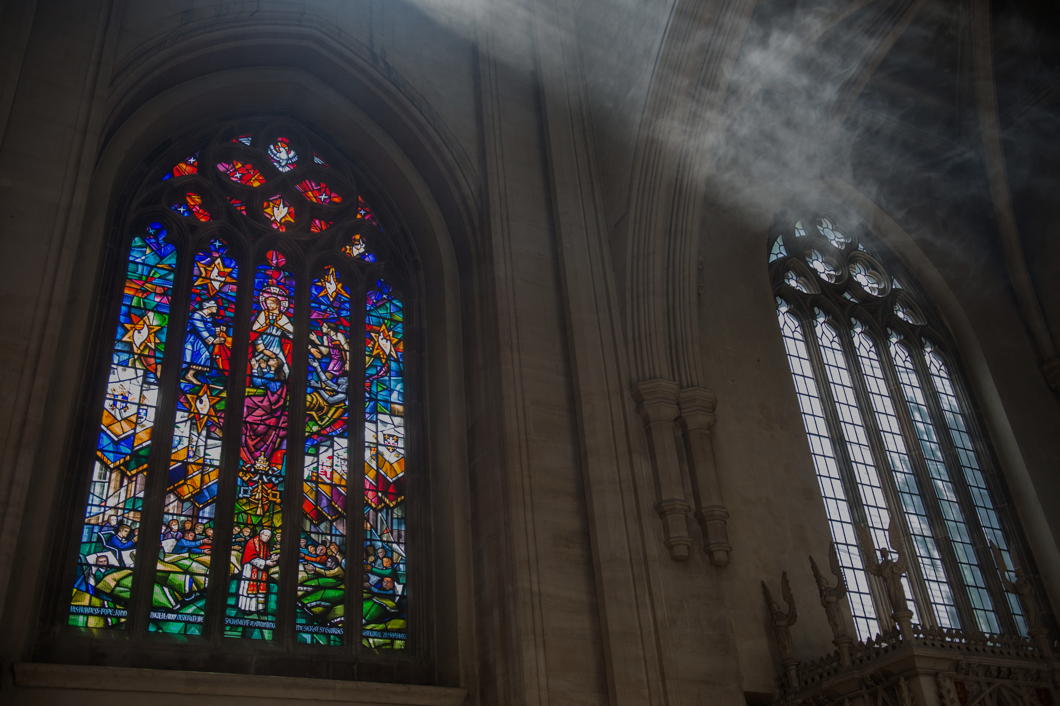
St George’s Cathedral
Lambeth Road, Southwark, London SE1 6HR
LAMBETH NORTH (Bakerloo)
ELEPHANT & CASTLE (Northern, Bakerloo)
Buses: C10, 360, 12, 453, 138, 53
A collection will be taken to defray the costs.
The Lady Chapel is to the right at the end of the north aisle of the Cathedral (on your right as you enter).
Earlier in the morning, as every Saturday at St George’s Cathedral, there will be Adoration of the Blessed Sacrament from 10:00 to 11:00 am, during which time Confessions will be heard.
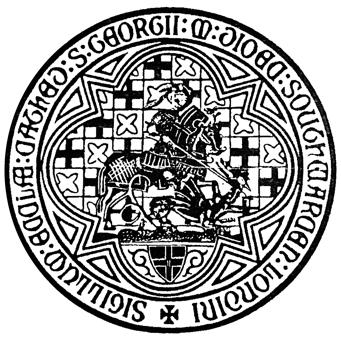
LMS Quarterly Mass at St George’s
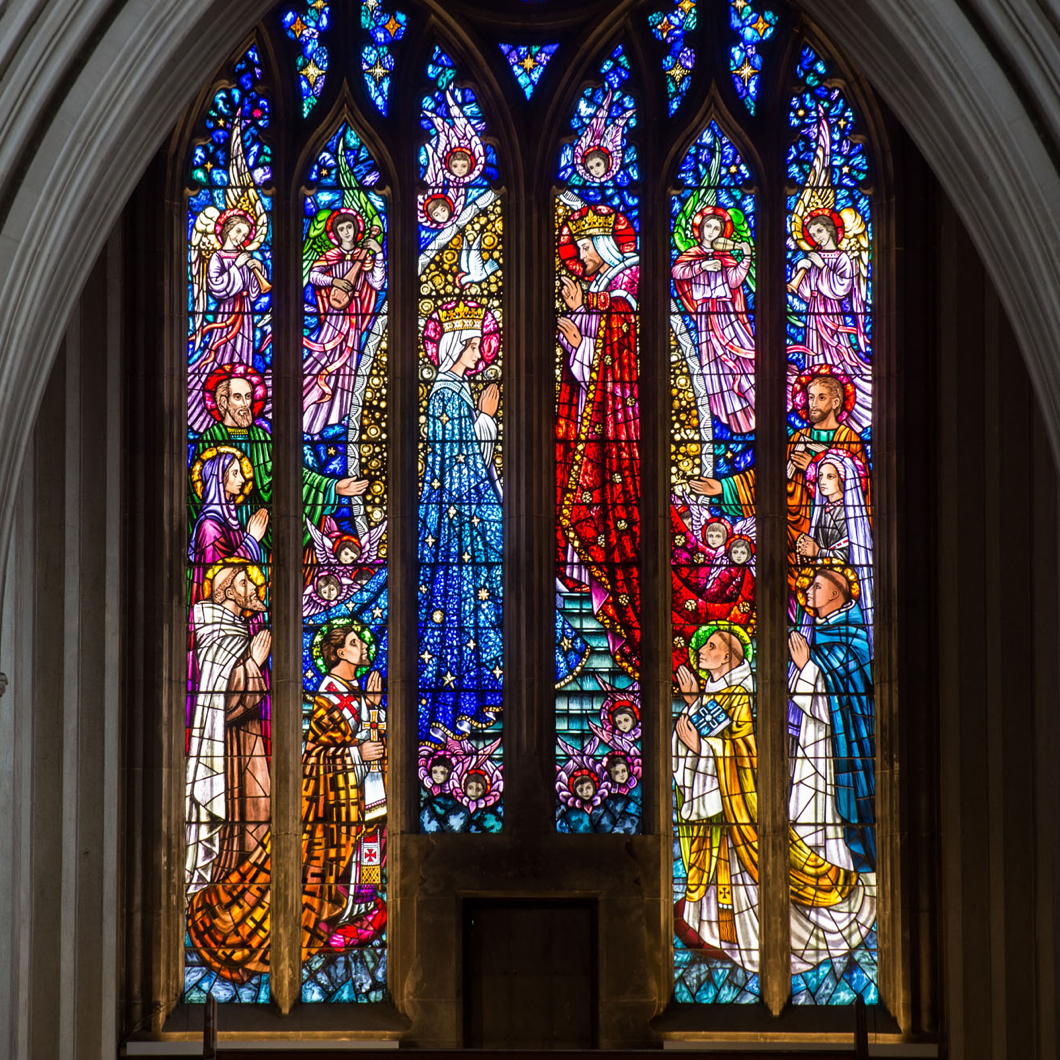
the regular quarterly Extraordinary Form Mass organised by the Latin Mass Society of England & Wales
will take place at
The Lady Chapel is to the right at the end of the north aisle of the Cathedral (on your right as you enter).
Earlier in the morning, as every Saturday at St George’s Cathedral, there will be Adoration of the Blessed Sacrament from 10:00 to 11:00 am, during which time Confessions will be heard.
Chartres 2015
Chartres is filed in my mind as the cathedral of my childhood. I must’ve been around 4 or 5 when I first walked amidst this medieval vision of stone and stained glass — some years before I ever visited the cathedral of New York where I was born. Cathedrals offer a prodigious mental stomping ground for the imagination of a young boy, and David Macaulay’s pen-and-ink book Cathedral (winner of the 1975 Deutscher Jugendliteraturpreis — take note!) I read and re-read over and over again as a child.
The marvel of this great church is that, while most medieval cathedrals took centuries to build, Chartres was constructed in an astonishing fifty-four years between 1194 and 1250, lending it a unity as an architectural composition that puts its rivals to shame. Chartres was made a diocese as early as the third century and tradition even upholds that from around the year 50 B.C., local Druids who had heard the prophecies of Isaiah here enshrined a statue of the ‘Virgo Paritura’, the Virgin-who-will-give-birth.
Having such a long history, Chartres’ fortunes have waxed and waned. In medieval times it was one of the most popular pilgrimage shrines in all of Europe, and in the 11th and 12th century its cathedral school far outshone England’s provincial attempt at a university at Oxford. But France’s civil wars and then revolution put an end to the town’s days as a destination for pilgrims until the poet Charles Péguy revived them himself in the years leading up to the First World War.
For the past thirty-three years, the largest pilgrimage to Chartres has been undertaken over Pentecost weekend, a bank holiday in France which happily coincided with our second May bank holiday in Great Britain this year. On this trek, over 11,000 pilgrims walk all the way from Notre Dame de Paris to Notre Dame de Chartres. Our chapter of about twenty pilgrims marched under the banner of Notre Dame de Philerme, patroness of the Order of Malta — mostly French and British but with a few participants from other countries as well. (more…)
Fr Kramer on Tradition
Readers might enjoy this video from CNS featuring Fr Joseph Kramer, one of the FSSP’s priests in Rome. I met Fr Kramer very briefly on the street when I was in Rome in 2006. It might be time for another visit to the Eternal City.
Catholic Ambassadors to the U.N.
Diplomats’ group hears Latin Mass at St Agnes
On Sunday 21 August 2011, the Church of St Agnes on 43rd Street in Manhattan was host to a group of Catholic ambassadors to the United Nations for the regular 11:00 Extraordinary Form Mass, offered by Fr. Richard Trezza OFM. (Fr. Cid, a recently ordained Franciscan priest was also in choro). The group included representatives from Grenada, Haiti, the Philippines, Korea, the United Kingdom, and Japan.
The informal gathering, formed just this year, is open to Catholic Permanent Representatives and Deputy Permanent Representatives — the first- and second-highest ranking diplomats at national missions to the U.N. — and has heard Mass at a number of different parishes around Manhattan. (more…)
The Start of Something Big in Argentina
The first-ever Nuestra Señora de Cristiandad Pilgrimage to Luján
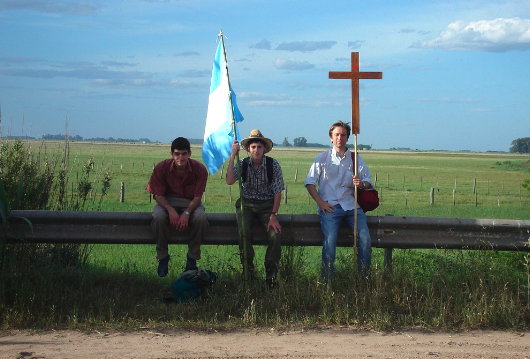
SMALL SEEDS, IF well-planted and tended to, flower into much larger growths. On a Friday morning last month, just four pilgrims set out from the town of Rawson in the Buenos Aires province of Argentina, but by the time they reached their destination — a Latin Mass in the Marian basilica of Luján — their numbers swelled to nearly a hundred. The pilgrimage of November 5th, 6th, and 7th, under the patronage of ‘Our Lady of Christendom’ (Nuestra Señora de Cristiandad) was inspired by the traditional Paris-Chartres pilgrimage every Pentecost weekend. The organisers hope that, like the Chartres pilgrimage, this trek to Luján will become an annual recurring event.
“Renewing Christendom in Argentina” was the theme of this year’s pilgrimage, which “seeks to promote the rich tradition of the Roman Catholic Church for our times” the organisers announced in a press release after its completion.
“This new 100-kilometre pilgrimage was an act of reparation and praise to God, imploring the salvation of souls through the renewal of Christian culture and the rediscovering of the bi-millennial tradition of the Church.” (more…)
The Situation at St Andrews
Or: A Lesson in Corroborating Your Sources
AS IF, WITH THE recent announcement that a certain St Andrean couple are getting engaged, there wasn’t enough for us to expend our idle chatter about, the University of St Andrews is thrust into the fore on an entirely separate matter. Damian Thompson, the provocative and informative Catholic Herald editor and indispensable Daily Telegraph blogger wrote a blog entry — Catholic students at St Andrews ‘can’t have the Latin Mass’ — relaying the claims of a student that he and a stable group of students have asked to have a monthly Mass in the Extraordinary Form, found a priest willing to say it, and have been denied. Fr. Z, the world’s most famous clerical blogger, soon picked up the story as well and made a few comments of his own.
The reality of the situation, it appears, is far removed from the one student’s claims. (more…)
Chartres MMX
The Pentecost Paris-Chartres Pilgrimage 2010
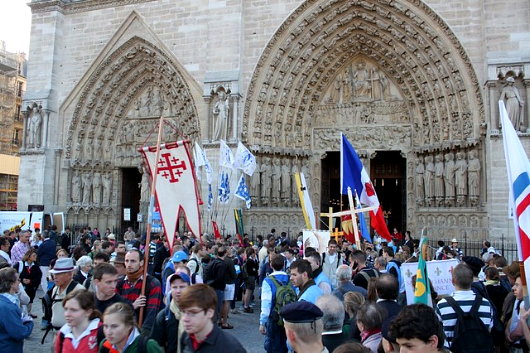
PENTECOST commemorates the descent of the Holy Spirit, often considered the birthday of the Church. Each year, this great feast of the Church is marked by the pilgrimage from the Cathedral of Notre-Dame de Paris on the Île de la Cité (above) to Notre-Dame de Chartres in the Orléanais by pilgrims young and old devoted to the traditional form of the Latin rite. The pilgrimage, often a feast of flags and banners, takes three days beginning on the Saturday of Pentecost weekend, continuing through the great feast itself, and arriving in Chartres on Pentecost Monday (which is still a public holiday in France). This year, Cardinal Vingt-Trois, the Archbishop of Paris, graciously led Benediction on the second day of the pilgrimage, and met with and blessed individual pilgrims. (more…)
Our Cardinal Strikes Again
Cardinal O’Brien, Scottish Primate, Preaches at Newly Ordained Priest’s First Mass in the Extraordinary Form at St. Mary’s Cathedral Edinburgh
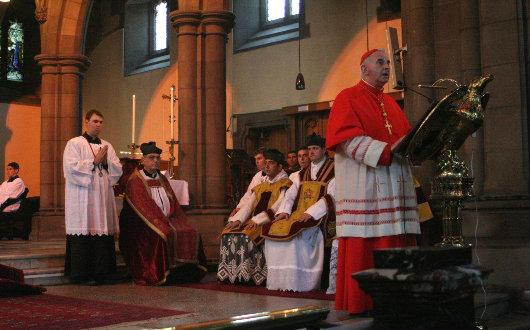
Keith Patrick O’Brien, the Primate of Scotland and Cardinal Archbishop of St Andrews & Edinburgh, this weekend preached at the first mass offered by the recently ordained Fr. Simon Harkins of the Priestly Fraternity of St. Peter. The mass was offered in the Cardinal’s own Cathedral of St. Mary in Edinburgh, Fr. Harkins’s own home town. The Very Rev. Fr Josef Bisig FSSP and the Very Rev. Fr. Franz-Karl Banauch FSSP assisted, and monks from the Transalpine Redemptorists of Papa Stronsay (who provided these photos) were also present, in addition to a number of diocesan priests.
I’ve spent the past eight years of my life divided between three (arch-) dioceses and I have to admit that Cardinal O’Brien is still the one I feel the greatest affection for. He’s an affable, uncomplicated fellow, and can be relied upon to defend what’s right in the media — unquestionably one of the best prelates in Britain today.
“I find him a much more approachable figure than other Scots prelates,” writes Damian Thompson, “less inclined to stand on his dignity despite (or perhaps because of) his red hat. I met him once at a party to relaunch the Scottish Catholic Observer, to whom he’s been a good friend; he didn’t sweep in surrounded by flunkeys, but hung around chatting in ordinary priest’s dress, reminding me a bit of Basil Hume in that respect.”
As it happens, I’m head of Cardinal O’Brien’s fan club on Facebook, which I encourage any Facebook users out there to join.
God bless our cardinal, and many congratulations to Fr. Hawkins! (more…)
The Roman Forum
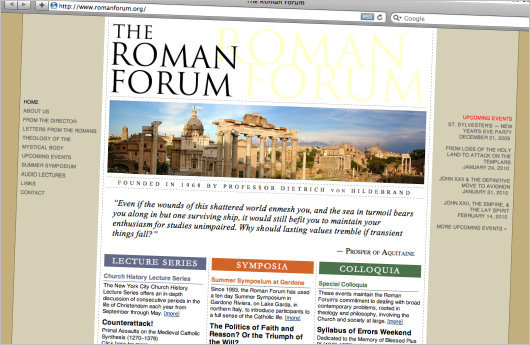
Over at The Hermeneutic of Continuity, Fr. Finigan points out the website of the Roman Forum, which (as it happens) was recently renovated by none other than yours truly. The Roman Forum is an excellent institution which organizes a church history lecture series here in New York, special colloquia such as the Syllabus of Errors weekend I recently attended, and of course its renowned Summer Symposium every year at Gardone on Lake Garda in Italy.
The theme of this year’s symposium is The Politics of Faith and Reason? Or the Triumph of the Will?. The list of illustrious names who will be in attendance this coming summer is indeed impressive: Jamie Bogle, the Chesterton Society’s Dale Ahlquist, Msgr. Barreiro, the Spanish jurist Miguel Ayuso, James Kalb, “Front Porcher” John Médaille, and Fr. Richard Trezza, who often says the old Mass at St. Agnes in New York on Sundays. And my friend Josh Copeland will be singing.
Each day involves three lectures (morning and before dinner), with sung Mass at noon, and musical and theatrical entertainments take place in the evenings after dinner. For years I’ve heard testimony from Gardone-goers about how enlightening, entertaining, and fun these ten-day symposia are, but I’ve not yet been able to attend myself.
The Roman Forum’s events are among the splendid outposts of civilization that preserve the animated spirit of the Faith so aptly captured by Hilaire Belloc’s lines: “Wherever the Catholic sun doth shine / There’s always laughter and good red wine.” I hope some of our readers will take a gander at their site and consider attending some of the numerous events they organize.
Chartres 2009
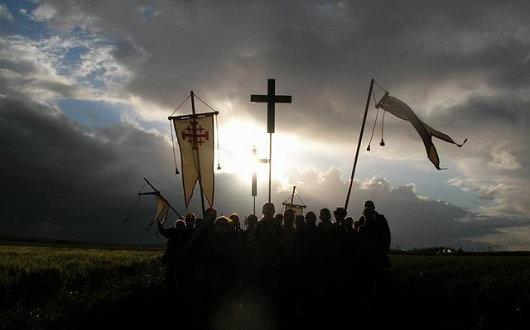
While there are but a few days to go, I can’t let this year depart without finally showing you photos of the 2009 Paris-Chartres pilgrimage which takes place every year on the weekend of Pentecost. (See 2008, 2005, 2004). The theme for the upcoming 28th Pilgrimage from Notre-Dame de Paris to Notre-Dame de Chartres was recently announced by the Association Notre-Dame de Chrétienté which organises the event. The 28th Pilgrimage will take place on the 22nd, 23rd, and 24th of May 2010, with the theme “The Church is Our Mother”. The themes for the individual days will be: 1) Teaching, under the patronage of St. Peter; 2) Sanctifying, under the patronage of St. Jean Vianney, the Curé d’Ars; 3) Governing, under the patronage of St. Pius X.
The following photos, however, are compiled from various sources, and show the pilgrimage which took place this past Pentecost. (more…)
Notes of the Netherlandic Church II
Archbishop Eijk chooses tradition-friendly priest as his cathedral rector
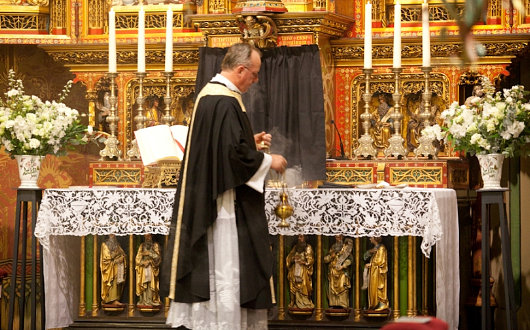
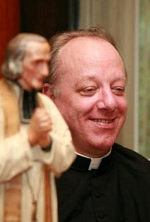
Fr. Harry Van der Vegt
The Archbishop of Utrecht & Primate of the Netherlands, Wim Eijk, has chosen a priest well-known for friendliness to traditional Catholics as the rector of his own cathedral. It was announced recently that Father Harry Van der Vegt is to be appointed rector of the Cathedral Church of St. Catherine in Utrecht, effective January 1, 2010. The priest will also be pastor of the Augustinuskerk and of St. Willibrord’s (which was the subject of the last Dutch church update).
Erik van Goor, of the Dutch periodical Bitterlemon, describes Fr. Van der Vegt as a “quiet but sturdy peasant’s son”. In the face of opposition from Modernist clergy and laity, Fr. Van der Vegt has been known to keep his cool, van Goor says. “Without making a political game of it, without showing any sign of reduced loyalty to the Church as it exists in the Netherlands, he remained quietly loyal to the tradition of the Church.”
“The appointment of Van der Vegt is actually a bit of a surprise”, notes one Dutch blogger, “because Archbishop Eijk is not really known as a major supporter of the old rite.” His Excellency was nonetheless responsible for normalizing the situation of the traditionalists of St. Willibrord’s Church in his diocese, mentioned previously.
Fr. Van der Vegt is currently serving the traditional faithful of Deventer in the province of Overijssel, and his new appointment will likely leave those people without a traditional mass for the time being. However, as Fr. Van der Vegt will be assuming control of St. Willibrord’s, the two FSSP priests currently there will probably be reassigned. The two currently travel all across the Low Countries, offering masses in Amsterdam, Bruges, Rotterdam, and elsewhere.
Parishioners at St. Willibrord’s, meanwhile, hope the new priest will say the extraordinary form at a more advantageous hour; it is currently said each Sunday at 5:30 in the evening.
Foundation ‘Ecclesia Dei’ Delft Releases 2009 Report
The Foundation ‘Ecclesia Dei’ Delft has released its latest report on the state of tradition in the Netherlandic church. ‘Ecclesia Dei’ is a group of Catholic faithful attached to the traditional liturgy as codified in the 1962 missal, and exists for the promotion of Catholic orthodoxy and specifically the liturgical tradition of the Church. In gauging the response to Benedict XVI’s motu proprio Summorum Pontificium, the report finds that “the Dutch Bishops Conference did not define a common policy concerning the implementation of the motu proprio.” The general attitude of the bishops is described as one of extreme passivity, “discouraging requests, ignoring the traditional liturgy, and keeping the faithful in ignorance of the motu proprio by a lack of information combined with disinformation about the traditional Latin liturgy.”
The report posits that bishops are primarily “afraid of the opposition by the modernist-infected priests and/or parish boards.” Many ordinary orthodox Catholics in the Netherlands are disillusioned with the strident Modernism that has infected much of the local church, and the bishops are said to fear “polemics” and “discord” even though, the report states, “they have not undertaken any measures to solve these problems for many years”.
On the teaching of the traditional liturgy in Dutch seminaries, the report confirms that instruction about the extraordinary form is almost nonexistent.
“However, since March 2009 and against the opposition of a number of priestly staff members at the seminary of St. Jan in ‘s-Hertogenbosch, a course about the theology of the traditional Latin liturgy has been given, but only because some of the seminarians claimed to have the right to it and showed a letter from the Pontifical Commission Ecclesia Dei.”
“As a result, 8 of the 12 seminarians now attend a private traditional Latin Mass three days a week at that seminary, despite the opposition.”
“In some diocese the situation has been improved in the first year of the motu proprio only by the initiatives of individual, relatively young priests.”
Some priests have attended German-organised training sessions, while others have received instruction from the FSSP priests in Amsterdam.
“Most of these priests are celebrating the traditional Latin liturgy in private and some even weekly in public now.”
As for the news of the specific dioceses of the Netherlands, much has already been written about the primatial see of Utrecht. In the Diocese of Haarlem-Amsterdam, Bishop Punt is prepared to grant FSSP a personal parish, from which the priests can work all over his diocese. Talks are ongoing. In other dioceses, however, foot-dragging, lip service, or ignorance of requests have been the norm.
Notes of the Netherlandic Church
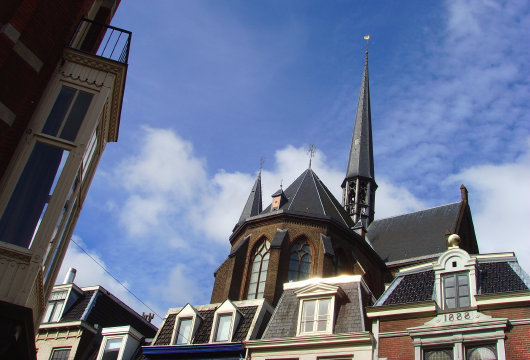
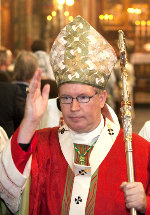
Willem Jacobus Eijk, Primate of the Netherlands
THE ANCIENT FORM of the Roman rite has returned to weekly use in Utrecht, the primatial see of the Netherlands. Under the guidance of Wim Eijk, Archbishop of Utrecht, the Church of St. Willibrord has introduced a weekly Tridentine liturgy each Sunday at 5:30 pm, to complement the 10:30 am Mass in Latin in the Ordinary Form. (Previously the old rite was offered only once monthly). The Extraordinary Form will be offered by Fr. A. Komorowski & Fr. M. Kromann Knudsen, both of the Priestly Fraternity of Saint Peter (FSSP, or Priesterbroederschap Sint Petrus in Dutch). St. Willibrord’s is a brilliant example of the nineteenth-century revival of gothic architecture, and the concurrent revival of Dutch Catholicism. Yet the parish was also emblematic of the Dutch church’s implosion in the 1960s & 70s. This beautiful, polychromatic monument to God was deconsecrated in 1967, and the diocese planned on demolishing the building. It was later sold, however, and occupied by an Assumptionist priest who continued saying the older form of mass. Joseph Luns, sometime NATO secretary-general and Dutch foreign minister, was a supporter of the apostolate at St. Willibrord’s.
The recently installed archbishop was keen to regularize the former parish’s situation, and erected it as a non-territorial parish under the auspices of the Vereniging voor Latijnse Liturgie (Association for Latin Liturgy) which promotes Latin in both the ordinary & extraordinary forms of the liturgy. The parish newsletter now proclaims that, at St. Willibrord’s, “all masses are once again celebrated ‘ad orientem'”, and both Sunday masses are accompanied by Gregorian chant. The church also revived, starting in 2002, the Procession of the Relics of St. Willibrord, which is held during the annual festival that opens the cultural season in Utrecht, in order to expose the tradition to a wider audience. (more…)
Mass for Prince Pedro Luiz
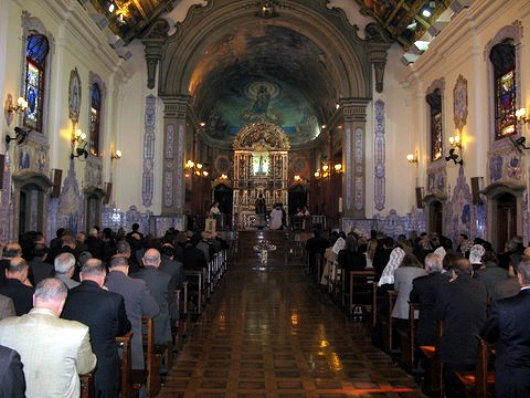
The “week’s mind” Mass, or Mass of seven days, was held a week after the death of Dom Pedro Luiz of Orleans-Braganza in São Paulo, Brazil on June 8, 2009. The Mass was offered according to the extraordinary (or Tridentine) form of the Latin rite. The members of the Imperial Family of Brazil were in attendence. (more…)
God and the Emperor
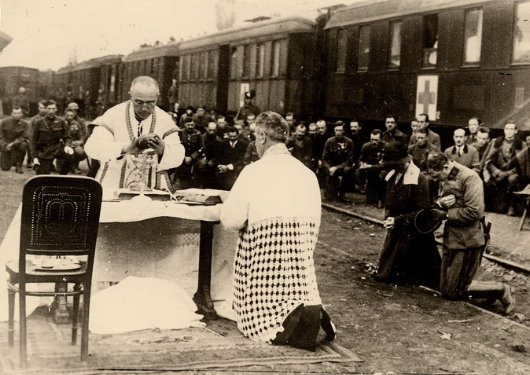
Chartres 2008

It’s that time of year again. This Pentecost weekend, 10,000 traditional Catholic pilgrims walked en masse over the space of three days from Paris to Chartres. The annual “Notre Dame de Chrétienté” (Our Lady of Christendom) pilgrimage is mostly French but with a healthy spattering of Britons, Americans, and others to add to their happy numbers. It begins in the Cathedral of Notre-Dame de Paris on the vigil of Pentecost and ends up at the Cathedral of Notre-Dame de Chartres on Pentecost Monday, which is traditionally a day off in France. Traditional Masses are said each day (with confessions heard beforehand) along the route.
CNN Comes to St Agnes
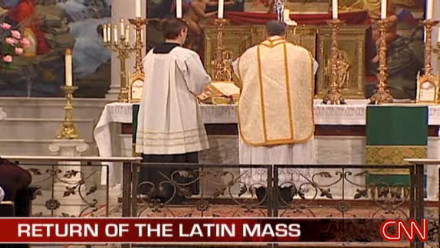
A month or so ago, Ms. Delia Gallagher of the Cable News Network (and cameraman) came to the Church of St. Agnes to take a few shots of the 11:00 Tridentine mass and to interview a few folks on the street afterwards. Those who spoke with her said she was genial, and the report she filed is available from the CNN website here (2:08, following a thirty-second advertisement).
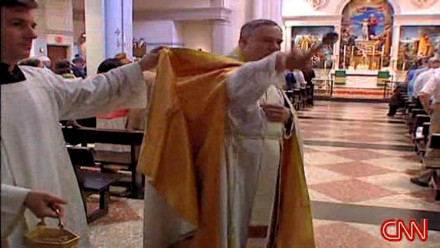
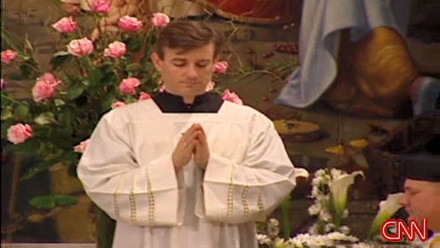
Dino!
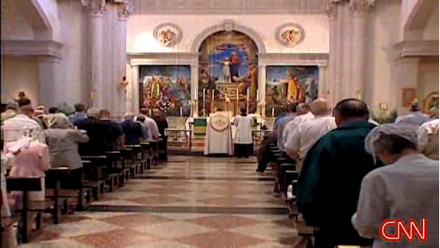
‘The Mass of All Time answers that need.’
In his superb column in this week’s Scotland on Sunday, Gerald Warner responds to the Holy Father’s motu proprio.
The bishops of England and Wales tried furiously to prevent the liberalisation of access to the Traditional Mass, lobbying the Vatican against it, although they had recently approved the regular celebration of a Mass for homosexuals. On the eve of the publication of the Papal document, Bishop Kieran Conry, of Arundel and Brighton, said: “Any liberalisation of the use of the rite may prove seriously divisive. It could encourage those who want to turn the clock back throughout the Church.” So, a liberal opposes liberalisation – why are we not surprised?
As for turning the clock back throughout the Church, it is the only possible remedy for the crisis that has afflicted it since the Second Vatican Catastrophe. The Novus Ordo (New Order of Mass) was invented by Archbishop Annibale Bugnini, assisted by six Protestant pastors, after the Vatican Council. When this appalling confection was presented to the 1967 Synod of Bishops it was indignantly rejected. Yet two years later it was universally imposed. Bugnini described it in 1974 as “a major conquest of the Catholic Church”.
Strange language from a Catholic bishop; but there were stranger things to come. In July, 1975 Bugnini was abruptly sacked after Pope Paul VI was shown evidence he was a Freemason. Bugnini denied the fact, but when the register of Italian Freemasonry came to light in 1976, it recorded Bugnini as having been initiated on April 23, 1963, with the esoteric code name ‘Buan’. So, even during the Vatican Council, Bugnini was already under automatic excommunication for Masonic membership. What possessed Paul VI to sack the author of the New Mass, but retain his liturgy for universal use? At least this episode throws light on the handshake at the ‘kiss of peace’ in the new rite. […]
For 40 years frenzied efforts have been made to stamp out the Traditional Mass and yet it has flourished. It is now past the point where there is the remotest prospect of extinguishing it. As Pope Benedict said in his explanatory letter accompanying the motu proprio Summorum Pontificum (“Of Supreme Pontiffs”), one of his reasons for freeing the Old Mass was the number of young people now flocking to it.
That is what the faded 1960s trendies who are now bishops and seminary rectors fear: the impossibility of maintaining a revolution that has burned itself out. The Second Vatican Council means as little to today’s youth as the Council of Chalcedon. Its elderly adherents are like dads dancing at the school disco. Many young people are seeking the mystical and the numinous. The Mass of All Time answers that need.
Within the past month the Vatican has issued two other documents: one restoring the requirement for a two-thirds majority at Papal conclaves, which rules out the future election of an extreme radical; and a reassertion of the doctrine that the Protestant sects cannot be recognised as ‘churches’. It will not damage ecumenism, because that died long ago. Its premise was that Rome must endlessly divest, while Canterbury ordained priestesses and moved ever further from Catholicism. [Ed.: bold mine.] When you see a Church of Scotland congregation praying the rosary you may believe ecumenism is a two-way process.
‘The Mass of All Time will outlive the Sixties revolutionaries‘, by Gerald Warner; Scotland on Sunday, 15 July 2007.
Previously: Martyrs of Spain, Pray for Us! | Warner on the Gotha
California Wedding
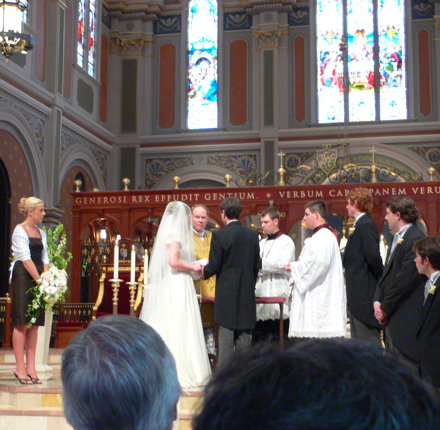
WHERE DOES ONE begin? Scotland, I suppose. I’ve known Abby since Day One in St Andrews. I was among the number of poor souls who were foolish enough to participate in the ‘overseas orientation’ for non-UK/RoI students. Through pure chance, a group of us who sat down to dinner in Andrew Melville Hall that night decided to venture into town that evening and see what was what. We went to the Central, which became my regular for a very long time, until replaced by the Russell for my tertian and magistrand years. Jon I met just over a year later, during his first few weeks at St Andrews (as I entered my second year). It was at the Catholic Society and he told me he came from Bristol. I was fairly ignorant of Bristol other than that it is home to the British Empire and Commonwealth Museum. I asked Jon about the museum and his answer was such as to confirm that he and I were on the same page of the book, so to speak. He didn’t come much to Canmore at the start and so we were not instant friends, though I do recall running into him in the corridor of New Hall at 2 or 3 in the morning one night and striking up a brief conversation (most likely telling him he ought to be coming to Canmore, since like-minded folk are a dime a dozen there).
Anyhow, by some time or another we were all best of friends, and both Jon and Abby have been the source of (and butt of) so many of the great amusements we enjoyed at St Andrews. Good God, how many laughs! In Canmore, the Cellar Bar, the Central, the Russell, in flats, in Edinburgh, in Rome, in Dublin, in New York, and most recently in California, whenever one is with Jon and Abby there is always a good time to be had, and an appropriately inappropriate comment to relish. I have picked up the habit of simply saying “ledge” (that is, short for “legend”) every time I utter the name of Jon Burke. Abby once desired that I verbally express precisely what it was that makes Jon such a legend, but all I could say was that it was of the same nature as the Sacraments in Eastern theology: appreciated, nourishing, and clung-to, but ultimately a mystery.
It was California then, which was host to our latest adventure, namely the joining in matrimony of Miss Abigail Hesser and Mr. Jonathan Burke. I flew in on Wednesday and upon checking in at the hotel, the desk clerk handed me a written message from Jon: “We’re in the bar, free cocktails!” The wonderful rehearsal dinner was the next evening, and I was privileged to have the best seat in the house, with Fr. E and Mrs. Hesser on my left and Abigail and Jon on my right. But Friday… Friday was the wedding! (more…)
Appeal to the Holy Father
From the British Isles
This appeal was recently sent to Pope Benedict XVI from a number of British intellectuals and public figures. (Source: Rorate Caeli).
In 1971 many leading British and international figures, among whose number were Yehudi Menuhin, Agatha Christie, Vladimir Ashkenazy, Nancy Mitford, Graham Greene, Joan Sutherland, and Ralph Richardson, presented a petition to His Holiness Pope Paul VI asking for the survival of the traditional Roman Catholic Mass on the grounds that it would be a serious loss to western culture. The then Archbishop of Westminster, Cardinal Heenan himself appealed to Pope Paul for the continued celebration of the traditional Mass. The full text of this appeal in 1971 was:
“If some senseless decree were to order the total or partial destruction of basilicas or cathedrals, then obviously it would be the educated – whatever their personal beliefs – who would rise up in horror to oppose such a possibility. Now the fact is that basilicas and cathedrals were built so as to celebrate a rite which, until a few months ago, constituted a living tradition. We are referring to the Roman Catholic Mass. Yet, according to the latest information in Rome, there is a plan to obliterate that Mass by the end of the current year. One of the axioms of contemporary publicity, religious as well as secular, is that modern man in general, and intellectuals in particular, have become intolerant of all forms of tradition and are anxious to suppress them and put something else in their place. But, like many other affirmations of our publicity machines, this axiom is false. Today, as in times gone by, educated people are in the vanguard where recognition of the value of tradition in concerned, and are the first to raise the alarm when it is threatened. We are not at this moment considering the religious or spiritual experience of millions of individuals. The rite in question, in its magnificent Latin text, has also inspired a host of priceless achievements in the arts – not only mystical works, but works by poets, philosophers, musicians, architects, painters and sculptors in all countries and epochs.
“Thus, it belongs to universal culture as well as to churchmen and formal Christians. In the materialistic and technocratic civilisation that is increasingly threatening the life of mind and spirit in its original creative expression – the word – it seems particularly inhuman to deprive man of word-forms in one of their most grandiose manifestations. The signatories of this appeal, which is entirely ecumenical and non-political, have been drawn from every branch of modern culture in Europe and elsewhere. They wish to call to the attention of the Holy See, the appalling responsibility it would incur in the history of the human spirit were it to refuse to allow the Traditional Mass to survive, even though this survival took place side by side with other liturgical reforms.”
This appeal in 1971 came at a crucial time in the history of civilisation when the future of the traditional Latin “Tridentine” Mass was in jeopardy. Pope Paul VI graciously acknowledged this appeal and the traditional Mass was saved, at least in England and Wales. Since this momentous appeal in 1971 the traditional Latin Mass has prospered once again among the faithful worldwide and is now celebrated in almost every country in the world. Now, in 2007, there is great hope and expectation that this treasure of civilisation will be freed from its current restrictions. We, the signatories of this petition, wish to associate ourselves to the sentiments expressed in the petition of 1971 which, perhaps, are even more valid today, and appeal to His Holiness Pope Benedict XVI in 2007 to allow the free celebration of the traditional Roman rite of Mass, the Mass of Ages, the Mass of Antiquity, on the altars of the Church.
Miss Madeleine Beard, M.Litt. (Cantab).
Dr. Mary Berry CBE, Founder of the Schola Gregoriana in Cambridge.
James Bogle, TD, MA, ACIarb, Barrister, Chairman of the Catholic Union of Great Britain.
Count Neri Capponi, Judge of the Tuscan Ecclesiastical Matrimonial Court.
Fr. Antony F.M. Conlon, Chaplain to the Latin Mass Society.
Julian Chadwick, Chairman – The Latin Mass Society of England and Wales.
Rev. Fr. Ronald Creighton-Jobe, The Oratory, London.
Fra’ Fredrik Crichton-Stuart, Chairman CIEL UK.
Leo Darroch, Secretary – International Federation Una Voce.
Adrian Davies, Barrister.
R.P. Davis, B.Phil., M.A., D.Phil (Oxon), retired senior lecturer in Ancient History, Queen’s University of Belfast; translator/commentator on the Liber Pontificalis of the Roman Church.
John Eidinow, Bodley Fellow and Dean, Merton College, Oxford.
Jonathan Evans MEP, Vice Chairman Catholic Union of Great Britain.
Fra’ Matthew Festing, OBE, TD, DL. Grand Prior of England of the Sovereign Military Order of Malta.
The Right Honourable Lord Gill, Lord Justice Clerk of Scotland.
Dr. Sheridan Gilley, Emeritus Reader, University of Durham.
Dr. Christopher Gillibrand, MA (Oxon).
Rev. Dr. Laurence Paul Hemming, Heythrop College, University of London.
Stephen Hough, Concert Pianist and Composer.
Neville Kyrke-Smith, National Director, Aid to the Church in Need UK
Prince Rupert zu Loewenstein, President of the British Association of the Sovereign Military Order of Malta. KCSG.
James MacMillan, CBE, Composer and Conductor.
Anthony McCarthy, Research Fellow, Linacre Centre for Healthcare Ethics.
Mrs. Daphne McLeod, Chairman – Pro Ecclesia et Pontifice.
Anthony Ozimic, MA (bioethics).
Dr. Susan Frank Parsons, President, Society for the Study of Christian Ethics (UK) and Co-Founder of the Society of St. Catherine of Siena.
Dr. Catherine Pickstock, Lecturer in Philosophy and Religion; Fellow – Emmanuel College, Cambridge.
Dr. Thomas Pink, Reader in Philosophy and Director of Philosophical Studies, Kings College, London.
Piers Paul Read, Novelist and Playwright; Vice-President of the Catholic Writers’ Guild of England and Wales.
The Rev’d. Dr. Alcuin Reid, Liturgical Scholar and Author.
Nicholas Richardson, Warden of Greyfriars Hall, Oxford.
Prof. Jonathan Riley-Smith, retired Dixie Professor of Ecclesiastical History, Cambridge University.
Fr. John Saward, Lisieux Senior Research Fellow in Theology, Greyfriars, Oxford University.
Dr. Joseph Shaw. Tutorial Fellow in Philosophy, St. Benet’s Hall, Oxford University.
Damien Thompson, Editor-in-Chief, The Catholic Herald.
Search
Instagram: @andcusack
Click here for my Instagram photos.Most Recent Posts
- Burns Tower April 19, 2024
- Patrick in Parliament March 18, 2024
- Articles of Note: 13 March 2024 March 13, 2024
- Cambridge March 9, 2024
- Taken on Trust March 4, 2024
Most Recent Comments
Book Wishlist
Monthly Archives
Categories


